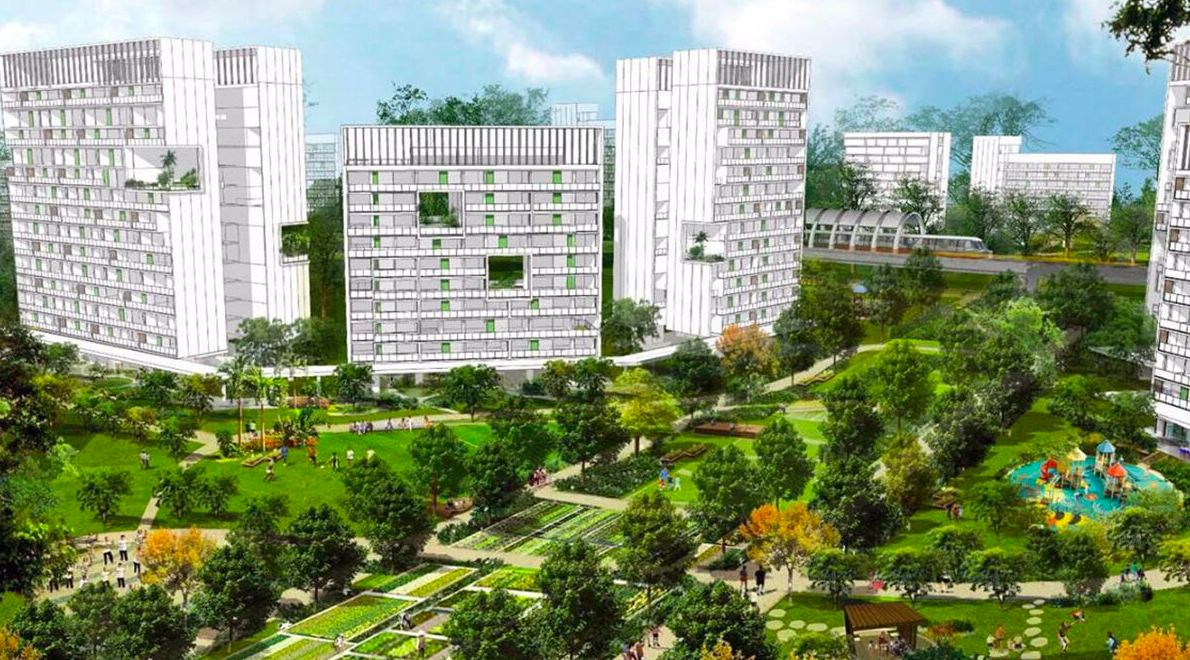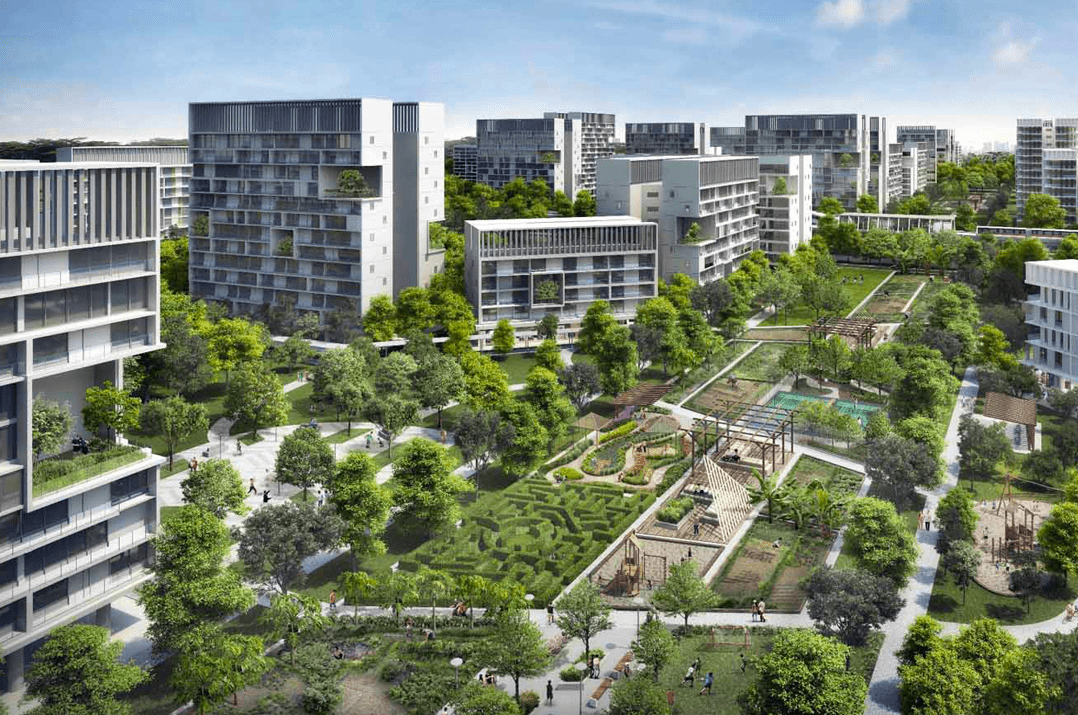Welcome to Tengah Plantation, where the beauty of lush greens meets the vision of a sustainable city development. Situated in Singapore, Tengah Plantation is undergoing a remarkable transformation, staying true to its agricultural roots while embracing sustainability. This article explores the journey of Tengah Plantation, from its origins as an oil palm plantation to becoming a model of sustainable city development.

Tengah Plantation: A Historical Overview
Welcome to the second section of our article, where we will take a closer look at the history of Tengah Plantation and its significant role in the palm oil industry. Understanding its past and its focus on plantation management is crucial in comprehending the transformative journey that Tengah Plantation has undertaken.
Founded many years ago, Tengah Plantation has been an integral part of the palm oil industry, contributing to Singapore’s agricultural landscape. As one of the leading palm oil plantations in the region, Tengah Plantation has demonstrated expertise in managing vast acres of land with sustainable agricultural practices.
Through effective plantation management, Tengah Plantation has been able to optimize palm oil production while keeping a careful eye on environmental conservation. The company’s dedication to responsible land use and sustainable practices has set the benchmark for the industry.
- Tengah Plantation has a rich history rooted in the palm oil industry
- The company has shown expertise in plantation management
- Tengah Plantation’s commitment to sustainable agriculture has been a key focus
- Responsible land use and sustainable practices have guided Tengah Plantation’s operations
The significance of Tengah Plantation’s historical journey provides the context for understanding the changes it has undergone to become a sustainable city in its own right. In the following sections, we will unveil the remarkable initiatives that propelled Tengah Plantation’s transformation into a model of sustainable city development.
Embracing Sustainable Agriculture at Tengah Plantation
Tengah Plantation is deeply committed to sustainable agriculture and environmental stewardship. Recognizing the importance of minimizing environmental impact, Tengah Plantation has implemented various initiatives and practices throughout its operations.
1. Organic Farming Techniques
One of the key components of Tengah Plantation’s sustainable agriculture approach is the adoption of organic farming techniques. By avoiding the use of synthetic fertilizers, pesticides, and genetically modified organisms (GMOs), Tengah Plantation ensures the production of high-quality crops while safeguarding the environment.
2. Crop Rotation and Diversification
Tengah Plantation practices crop rotation and diversification to promote soil health and prevent the depletion of nutrients. This approach not only enhances the long-term sustainability of agriculture but also reduces the reliance on chemical inputs, leading to a more balanced and resilient ecosystem.
3. Water Conservation and Efficient Irrigation
Recognizing the importance of water conservation, Tengah Plantation has implemented efficient irrigation systems that optimize water usage. By employing techniques such as drip irrigation and rainwater harvesting, water consumption is minimized, and water resources are conserved.
4. Biodiversity Conservation
Tengah Plantation places great emphasis on maintaining biodiversity within its agricultural practices. By preserving natural habitats, implementing buffer zones, and promoting the growth of native flora, Tengah Plantation creates a conducive environment for diverse wildlife and beneficial insects.
5. Community Engagement and Education
Tengah Plantation actively engages with the local community and provides educational programs and workshops to raise awareness about sustainable agriculture. By sharing knowledge and best practices, Tengah Plantation aims to inspire individuals to adopt environmentally friendly practices in their own lives.
Through its commitment to sustainable agriculture and environmental stewardship, Tengah Plantation sets an example for other agricultural entities. By implementing organic farming techniques, practicing crop rotation, conserving water, preserving biodiversity, and engaging with the community, Tengah Plantation demonstrates its dedication to a greener and more sustainable future.
The Journey to Sustainable City Development
In its pursuit of sustainable city development, Tengah Plantation has undergone a remarkable transformation from an oil palm plantation to a visionary and eco-friendly urban development. This journey towards creating a sustainable city has involved numerous steps that prioritize plantation development, agricultural sustainability, and environmental preservation.
Promoting Plantation Development
Tengah Plantation recognizes the importance of striking a balance between urbanization and agricultural sustainability. To achieve this, the plantation development at Tengah Plantation has undergone strategic planning and innovative practices. The integration of green spaces, roadside orchards, and community gardens not only preserves the area’s agricultural heritage but also encourages community engagement and enhances the quality of life.
Advancing Agricultural Sustainability
At the heart of Tengah Plantation’s transformation lies its commitment to agricultural sustainability. The plantation’s practices focus on responsible land management, efficient resource utilization, and organic farming techniques. By adopting sustainable agriculture methods, Tengah Plantation minimizes its environmental impact, preserves biodiversity, and contributes to long-term food security for the local community.
Building an Ecological Infrastructure
Tengah Plantation’s journey towards sustainable city development involves the careful design and creation of an ecological infrastructure. Green corridors, rain gardens, and rooftop farms are just a few examples of how the plantation’s infrastructure promotes ecological balance and supports the conservation of natural resources. These eco-friendly features not only enhance the overall sustainability of the city but also create a harmonious coexistence between urbanization and the natural environment.
- Integrating green corridors to connect different parts of the city and facilitate a seamless movement of wildlife.
- Implementing rain gardens and bioswales to manage stormwater runoff and improve water quality.
- Establishing rooftop farms that enable urban agriculture, reducing food miles and promoting self-sufficiency.
- Adopting smart technologies for efficient energy and water management, reducing carbon footprint and resource wastage.
The transformation of Tengah Plantation into a sustainable city is a testament to the commitment and vision of its stakeholders. By embracing plantation development, agricultural sustainability, and environmental stewardship, Tengah Plantation has set an exemplary standard for sustainable city development in Singapore and beyond.

Building a Model of Sustainable City Development
At Tengah Plantation, the transformation from an oil palm plantation to a sustainable city goes beyond just urban development. It is about creating a model of sustainable city development that integrates agricultural sustainability into every aspect.
One of the key features of Tengah Plantation’s approach to sustainable city development is innovative urban planning. The city is designed with a focus on green spaces, with every neighborhood having easy access to parks, gardens, and recreational areas. This design not only enhances the quality of life for residents but also promotes environmental sustainability by preserving biodiversity and providing space for urban agriculture.
Infrastructure design is another area where Tengah Plantation shines as a model of sustainable city development. The city utilizes smart technologies and renewable energy sources to reduce its ecological footprint. From solar panels on rooftops to an efficient waste management system, every aspect of infrastructure is designed with sustainability in mind. Tengah Plantation also integrates sustainable transportation solutions, such as cycling paths and electric vehicle charging stations, to minimize carbon emissions and encourage eco-friendly habits.
Community engagement plays a crucial role in Tengah Plantation’s sustainable city development. The city promotes community involvement in urban farming initiatives, where residents can participate in growing their own food in community gardens. This not only fosters a sense of community but also encourages sustainable food production and reduces reliance on external sources.
Tengah Plantation’s Model of Sustainable City Development:
- Innovative urban planning with a focus on green spaces
- Infrastructure design utilizing smart technologies and renewable energy sources
- Integration of sustainable transportation solutions
- Community engagement through urban farming initiatives
By combining these features and initiatives, Tengah Plantation creates a sustainable environment that preserves its agricultural roots while embracing the future of urban living. The city serves as a blueprint for other sustainable city developments, showcasing how agricultural sustainability can be an integral part of urban planning and design.
The Future of Tengah Plantation
As Tengah Plantation moves forward, it envisions a future that combines its agribusiness expertise with sustainable city development. With its strong foundation in the palm oil industry and a commitment to environmental stewardship, Tengah Plantation is well-positioned to play a crucial role in shaping a sustainable and thriving Singapore.
One of the key aspects of Tengah Plantation’s future lies in its potential as an agribusiness leader. With its extensive experience in plantation management and sustainable agriculture practices, Tengah Plantation aims to contribute to the growth and innovation of the agribusiness sector in Singapore. By leveraging its expertise, Tengah Plantation can provide valuable insights and support to other agricultural businesses, fostering a stronger and more sustainable industry as a whole.
Furthermore, Tengah Plantation recognizes the immense potential it holds in sustainable city development. By embracing environmentally-friendly practices and innovative approaches to urban planning, Tengah Plantation can serve as a model for creating sustainable cities. This includes integrating green spaces and biodiversity into urban landscapes, implementing smart technologies for efficient resource management, and promoting community engagement for a holistic approach to sustainable urban living.

Key Contributions of Tengah Plantation:
- Driving innovation in agribusiness and supporting the growth of Singapore’s agricultural sector.
- Pioneering sustainable city development initiatives by incorporating green spaces and smart technologies.
- Creating a blueprint for other cities to follow in seamlessly integrating agriculture and urban development.
- Promoting environmental stewardship and biodiversity preservation within urban environments.
Through its dedication to agribusiness and sustainable city development, Tengah Plantation envisions a future where urban living and agriculture coexist harmoniously. By capitalizing on its agricultural roots and commitment to sustainability, Tengah Plantation is poised to make significant contributions to the development of a greener, more sustainable Singapore.
Conclusion
In conclusion, the transformation of Tengah Plantation from an oil palm plantation to a sustainable city is a remarkable achievement in sustainable city development. By staying true to its agricultural roots and embracing sustainable practices, Tengah Plantation has set an inspiring example for other cities around the world.
The commitment to agricultural sustainability at Tengah Plantation is evident through their dedication to sustainable agriculture and environmental stewardship. Through various initiatives and practices, Tengah Plantation has minimized its environmental impact and prioritized the well-being of the ecosystem.
As Tengah Plantation continues to pave the way for sustainable city development, the future looks promising. The integration of urban planning, infrastructure design, and community engagement has created a model for achieving a harmonious balance between urban development and sustainable agriculture.
By championing agricultural sustainability and reimagining the future of cities, Tengah Plantation is shaping the landscape of sustainable city development in Singapore and beyond. This transformation serves as a beacon of hope and inspiration for cities worldwide, reminding us of the importance of living in harmony with the environment for a better future.

